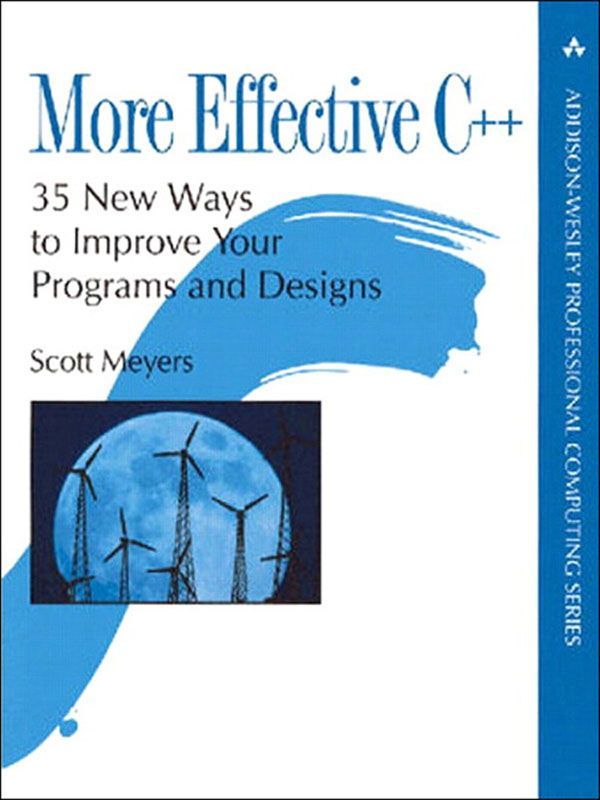“Every C++ professional needs a copy of “Effective C++.” It is an absolute must-read for anyone thinking of doing serious C++ development. If you’ve never read “Effective C++” and you think you know everything about C++, think again.”
– Steve Schirripa, Software Engineer, Google “C++ and the C++ community have grown up in the last fifteen years, and the third edition of “Effective C++” reflects this. The clear and precise style of the book is evidence of Scott’s deep insight and distinctive ability to impart knowledge.”
– Gerhard Kreuzer, Research and Development Engineer, Siemens AG The first two editions of “Effective C++” were embraced by hundreds of thousands of programmers worldwide. The reason is clear: Scott Meyers’ practical approach to C++ describes the rules of thumb used by the experts – the things they almost always do or almost always avoid doing – to produce clear, correct, efficient code. The book is organized around 55 specific guidelines, each of which describes a way to write better C++. Each is backed by concrete examples. For this third edition, more than half the content is new, including added chapters on managing resources and using templates. Topics from the second edition have been extensively revised to reflect modern design considerations, including exceptions, design patterns, and multithreading. Important features of “Effective C++” include:
- Expert guidance on the design of effective classes, functions, templates, and inheritance hierarchies.
- Applications of new “TR1” standard library functionality, along with comparisons to existing standard library components.
- Insights into differences between C++ and other languages (e.g., Java, C#, ethat help developers from those languages assimilate “the C++ way” of doing things.
Excerpt. © Reprinted by permission. All rights reserved.
I wrote the original edition of Effective C++ in 1991. When the time came for a second edition in 1997, I updated the material in important ways, but, because I didn’t want to confuse readers familiar with the first edition, I did my best to retain the existing structure: 48 of the original 50 Item titles remained essentially unchanged. If the book were a house, the second edition was the equivalent of freshening things up by replacing carpets, paint, and light fixtures.
For the third edition, I tore the place down to the studs. (There were times I wished I’d gone all the way to the foundation.) The world of C++ has undergone enormous change since 1991, and the goal of this book — to identify the most important C++ programming guidelines in a small, readable package — was no longer served by the Items I’d established nearly 15 years earlier. In 1991, it was reasonable to assume that C++ programmers came from a C background. Now, programmers moving to C++ are just as likely to come from Java or C#. In 1991, inheritance and object-oriented programming were new to most programmers. Now they’re well-established concepts, and exceptions, templates, and generic programming are the areas where people need more guidance. In 1991, nobody had heard of design patterns. Now it’s hard to discuss software systems without referring to them. In 1991, work had just begun on a formal standard for C++. Now that standard is eight years old, and work has begun on the next version.
To address these changes, I wiped the slate as clean as I could and asked myself, “What are the most important pieces of advice for practicing C++ programmers in 2005?” The result is the set of Items in this new edition. The book has new chapters on resource management and on programming with templates. In fact, template concerns are woven throughout the text, because they affect almost everything in C++. The book also includes new material on programming in the presence of exceptions, on applying design patterns, and on using the new TR1 library facilities. (TR1 is described in Item54.) It acknowledges that techniques and approaches that work well in single-threaded systems may not be appropriate in multithreaded systems. Well over half the material in the book is new. However, most of the fundamental information in the second edition continues to be important, so I found a way to retain it in one form or another. (You’ll find a mapping between the second and third edition Items in Appendix B.)
I’ve worked hard to make this book as good as I can, but I have no illusions that it’s perfect. If you feel that some of the Items in this book are inappropriate as general advice; that there is a better way to accomplish a task examined in the book; or that one or more of the technical discussions is unclear, incomplete, or misleading, please tell me. If you find an error of any kind — technical, grammatical, typographical, whatever — please tell me that, too. I’ll gladly add to the acknowledgments in later printings the name of the first person to bring each problem to my attention.
Even with the number of Items expanded to 55, the set of guidelines in this book is far from exhaustive. But coming up with good rules — ones that apply to almost all applications almost all the time — is harder than it might seem. If you have suggestions for additional guidelines, I would be delighted to hear about them.
Scott Douglas Meyers
Stafford, Oregon
April 2005
Excerpt. © Reprinted by permission. All rights reserved.
I wrote the original edition of Effective C++ in 1991. When the time came for a second edition in 1997, I updated the material in important ways, but, because I didn’t want to confuse readers familiar with the first edition, I did my best to retain the existing structure: 48 of the original 50 Item titles remained essentially unchanged. If the book were a house, the second edition was the equivalent of freshening things up by replacing carpets, paint, and light fixtures.
For the third edition, I tore the place down to the studs. (There were times I wished I’d gone all the way to the foundation.) The world of C++ has undergone enormous change since 1991, and the goal of this book — to identify the most important C++ programming guidelines in a small, readable package — was no longer served by the Items I’d established nearly 15 years earlier. In 1991, it was reasonable to assume that C++ programmers came from a C background. Now, programmers moving to C++ are just as likely to come from Java or C#. In 1991, inheritance and object-oriented programming were new to most programmers. Now they’re well-established concepts, and exceptions, templates, and generic programming are the areas where people need more guidance. In 1991, nobody had heard of design patterns. Now it’s hard to discuss software systems without referring to them. In 1991, work had just begun on a formal standard for C++. Now that standard is eight years old, and work has begun on the next version.
To address these changes, I wiped the slate as clean as I could and asked myself, “What are the most important pieces of advice for practicing C++ programmers in 2005?” The result is the set of Items in this new edition. The book has new chapters on resource management and on programming with templates. In fact, template concerns are woven throughout the text, because they affect almost everything in C++. The book also includes new material on programming in the presence of exceptions, on applying design patterns, and on using the new TR1 library facilities. (TR1 is described in Item54.) It acknowledges that techniques and approaches that work well in single-threaded systems may not be appropriate in multithreaded systems. Well over half the material in the book is new. However, most of the fundamental information in the second edition continues to be important, so I found a way to retain it in one form or another. (You’ll find a mapping between the second and third edition Items in Appendix B.)
I’ve worked hard to make this book as good as I can, but I have no illusions that it’s perfect. If you feel that some of the Items in this book are inappropriate as general advice; that there is a better way to accomplish a task examined in the book; or that one or more of the technical discussions is unclear, incomplete, or misleading, please tell me. If you find an error of any kind — technical, grammatical, typographical, whatever — please tell me that, too. I’ll gladly add to the acknowledgments in later printings the name of the first person to bring each problem to my attention.
Even with the number of Items expanded to 55, the set of guidelines in this book is far from exhaustive. But coming up with good rules — ones that apply to almost all applications almost all the time — is harder than it might seem. If you have suggestions for additional guidelines, I would be delighted to hear about them.
I maintain a list of changes to this book since its first printing, including bug fixes, clarifications, and technical updates. The list is available at the Effective C++ Errata web page, http://aristeia.com/BookErrata/ec++3e-errata.html. If you’d like to be notified when I update the list, I encourage you to join my mailing list. I use it to make announcements likely to interest people who follow my professional work. For details, consult http://aristeia.com/MailingList/.
Scott Douglas Meyers
Stafford, Oregon
April 2005




.jpg?imageMogr2/thumbnail/!1096x1600r|imageMogr2/gravity/Center/crop/1096x1600)




评论0